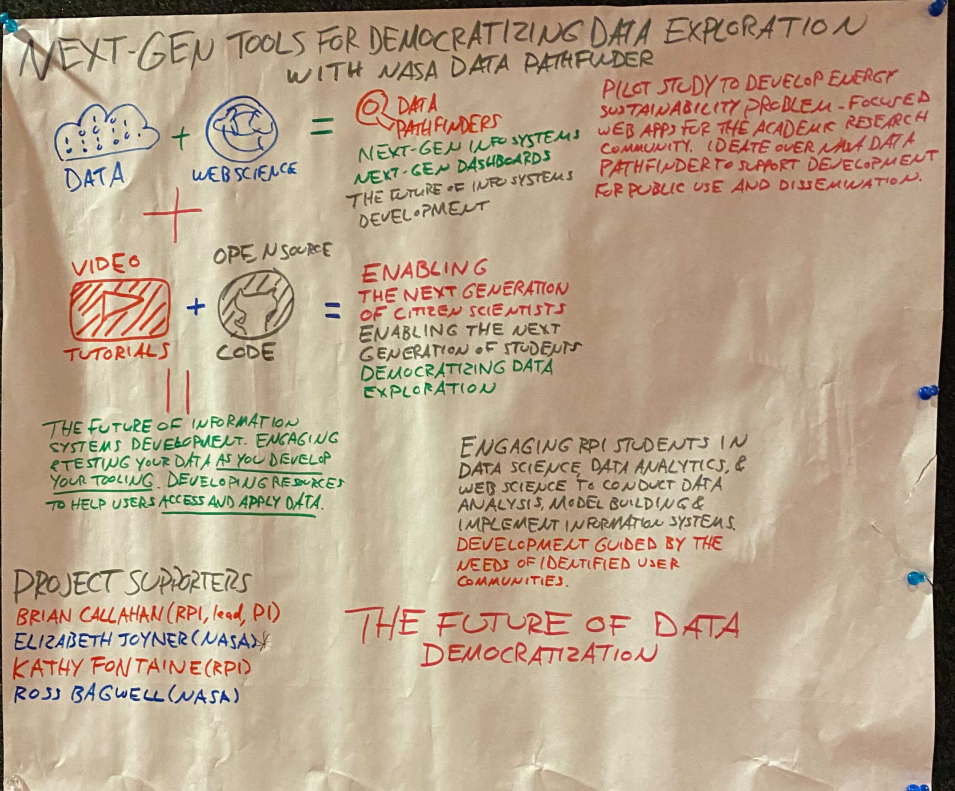The right conditions can be the catalyst to release the potential energy of an idea. Such a catalyst occurred at the 2022 Earth Science Information Partners (ESIP) Summer Meeting that resulted in an innovative initiative between NASA and the Rensselaer Polytechnic Institute (RPI) in Troy, NY. ESIP provided the perfect venue to spark a collaboration that is helping RPI students create apps for using Earth observation data and teaching them how to use these data ethically.
The Catalyst
Created by NASA in 1998, ESIP is a community of data and information technology practitioners who coordinate Earth science interoperability efforts. Starting in 2008, a new feature was added to the last two days of the ESIP Summer Meeting—FUNding Friday.
“We spell FUNding Friday with a capital F-U-N since we want it to be a fun, creative, exciting experience at the end of the Summer Meeting,” says Susan Shingledecker, ESIP executive director. “We want it to be the catalyst that takes a great idea or a brainstorm that happens in a session or in a hallway conversation and creates the incentive to move an idea forward.”
FUNding Friday begins with a raucous, low-tech session where teams create posters about their ideas using flip chart paper and colored markers. “The teams work together on their posters Thursday into Friday morning, then we kick off our final meeting event on Friday with lightning presentations by the teams,” says Shingledecker. “All of the in-person meeting attendees get ballots and vote on the project ideas they most want to see funded.”
Two types of funding awards are given, one for regular meeting attendees and a second for teachers supporting grades K through 12. Cash awards range from $3,000 to $5,000 and include funding for award recipients to attend the next ESIP Summer Meeting to formally present their work and accomplishments. Since 2008, more than 90 member and student projects have received FUNding Friday awards.
It was in the FUNding Friday crucible that NASA and RPI developed a framework that has resulted in a year of discovery, work, and innovation.
The Connection
RPI faculty reached out to NASA several years ago to explore the possibility of having their graduate students work with large Earth observation datasets. Thilanka Munasinghe, a lecturer with the Information Technology and Web Science (ITWS) program in RPI’s School of Science, had his students work with these datasets in his data science and data analytics classes.
During the 2021 and 2022 ESIP Summer Meetings, Elizabeth Joyner, a Science Systems and Applications, Inc. (SSAI) contractor with NASA's Earth Science Data Systems (ESDS) Program and the ESDS community coordinator, saw presentations of work by Munasinghe and his RPI colleagues. At the 2022 summer meeting, she proposed that the RPI team join NASA ESDS in a FUNding Friday proposal to have RPI students use renewable energy data distributed by NASA to develop apps and explore ways of fostering better data use. This work would benefit both RPI and NASA: RPI students would gain experience working with real-world data and developing apps; NASA’s ESDS would gain better insight into how renewable energy data can be used in the development of a new Renewable Energy Data Pathfinder.
The team’s FUNding Friday pitch for Next Generation Tools for Democratizing Data Exploration in NASA Data Pathfinders was selected for funding. Over the next year, Joyner and Ross Bagwell, a SSAI contractor supporting NASA’s Earth Science Data and Information System (ESDIS) Project as principal systems engineer, guided RPI students in using NASA Earth observation data in classes taught by Munasinghe and his RPI colleagues Dr. Brian Robert Callahan and Dr. Kathy Fontaine. Callahan is an ITWS lecturer and director of the Rensselaer Cybersecurity Collaboratory. Fontaine is an ITWS senior lecturer and the program manager for the IBM/RPI Artificial Intelligence (AI) research collaboration.
“We put a FUNding Friday presentation together that has three parts,” says Fontaine. “One is Thilanka’s class working with the datasets on renewable energy in the fall and spring, one is Brian’s class developing apps, and one is my class on ethical informatics, which looks at ethical issues around the research.”
The Work
During the fall 2022 semester, eight student groups worked on projects related to renewable energy in Munasinghe’s data science classes, and Joyner and Bagwell worked with the students every other week. “We discussed, explored, and analyzed data related to renewable energy applications. We conducted machine learning applications, data analytics, and built machine learning models,” says Munasinghe. “With the help of Elizabeth Joyner and Ross Bagwell, we identified what machine learning models can be used [to analyze these data].”
Using the data on which Munasinghe and his students worked, Callahan and his students created apps to enable use of these data by a broader range of data users. “We took the work that Thilanka did and turned it into real-world web applications,” says Callahan.


